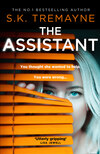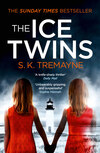Kitabı oku: «The Assistant», sayfa 4
I sigh. Defeated. ‘You’re right. And I’m hardly in a position to criticize: my love life is a desert. The bloody Atacama. You think I should get a sugar daddy? He’d have to have his own hair though.’
We fall silent as she finishes the cigarette. I feel a need to say something about what is happening. We’ve been talking for ages and I haven’t even touched on it. And somehow it’s 10 p.m. and I might not get another chance, if she’s going back to Arlo’s tonight. Later I will walk down silent solitary Jackson’s Lane, listening for footsteps behind me, to get the lonely Tube at spooky Highgate. I hate Highgate Tube, buried like a tomb under that little enclave of snowy urban woods. Like a place in a frightening fairy tale from Romania where there’d be wolves. Loping. Howling.
‘Tabitha,’ I say, quickly, airily, casually as possible. ‘You know all those Home Assistants at Delancey.’
She is grinding another cigarette butt into the soil of a small potted tree.
‘Uh-uh. What about them?’
‘I was wondering how they got there.’
Tabitha frowns as she squirts minty breath-freshener into her mouth.
‘Sorry? What do you mean?’
‘Like: who bought and installed them?’
The frown persists, but only for a second.
‘Arlo, natcho. Arlo bought them, for me. But he didn’t install them – far too mechanical.’ She twists her mouth into a thoughtful pout. ‘Come to think of it, it was your ex-husband who installed them. Did it as a favour. You don’t remember?’
‘Sorry? What?’
‘Your ex, darl, your ex. You haven’t forgotten him already? Simon! He came over one day. He set it all up. The smart home. The entire system.’
And with that she turns and goes back into the pub. The red glow of the patio heaters shines on the smoke left behind, a fast disappearing scarlet ghost, shivering into nothing in the cold. I wait, and think about Simon, and about this peculiar revelation, because he never told me he did this: came over and did this favour for Tabitha? He never mentioned it once. Not while we were married, not since.
They did this, all three of them, without telling me. Then Tabitha asked me to move in. And the rent was so ridiculously low, I was obliged to agree. How could I possibly resist?
Such a wonderful offer. Impossibly tempting. Come and live here, with all that technology.
A big grey moth has got trapped in the patio heater. I look at it, unable to help. The poor creature was attracted by the light, but the light and heat have lured it to a terrible end. I stand and watch it burn to death in fluttering agony. The antennae are the last things to stop twitching.
7
Jo
The glasses are drained, the air is kissed, Arlo’s friends have gone back to their own beautiful period houses with underground swimming pools. Waving goodbye to Tabitha, I walk out into a midnight frost that is predatory in its iciness. Like the sky, the air, the entire world is made of cold blackness, waiting to shatter. Highgate tonight is a glass daguerreotype, some historic and fragile photograph from the 1840s; huddled grey figures are slowed and blurred and lifeless in the freezing mist, and far away down Highgate Hill, past the cemetery, the car lights turn left, and right, and always further away, always departing.
Diminishing into nothing.
Most of the bars and restaurants of Highgate Village are already shut, at 11 p.m. Why? It feels jarring, though I suppose it’s that post-Christmas lull of early January when everyone is too poor or torpid to brave the chill. It does, however, mean my walk down Jackson’s Lane is lonelier than ever.
The eighteenth- and seventeenth-century houses crowd closer, the gardens get smaller and older, then I am walking down a slender path of frozen mud, with eroded bare redbrick walls on either side, my footsteps echoing as I go. My isolation is pure.
Instinctively, I take out my phone. I want to see if my loneliness is about to be diluted. Are there any messages for me on OKCupid?
No. Not a single one. What have I done wrong? Is it the photo, was I too sarcastic? Probably I need to refine the profile.
And yet as I walk slowly to the Tube, breathing the cold cold air, despairing of my love life, an obvious thought occurs.
Liam.
I feel deep guilt about my online flirtation with Liam, what it did to my marriage, yet there’s no denying the flirtation was fun. We never actually met – my marriage collapsed before I took the final, fatal step – but the texts, messages, and emails were many and they were sexy. They just were. He was funny. Clever. Self-deprecating. And the photos showed a very good-looking man.
Why not get in touch? We ended so abruptly. After I told him that Simon had discovered my sexts, our erotic dialogue, and that I was headed for divorce, I disappeared on him. It seemed best. The guilt was too much.
I guess I ghosted.
But now I am divorced, and single. Perhaps dashing Liam is still single, too?
Stopping on Jackson’s Lane, in the chilling mist, I look for Liam. And there he is: WhatsApp. And it looks like he’s online. Right this minute.
I check the time. It’s a bit late, but he could be working in the bar, and, as I recall, he liked talking late anyway. We would exchange messages, and then photos – all those foolish photos, – deep into the night. Even as Simon softly snored in the bed alongside.
Ignoring my very guilty conscience, I type a message:
Hey. Guess who???
I wait. The ticks go blue. He has read my message. He must be replying. My heart speeds. A bike hisses downhill, towards Highgate Tube, its light so feeble in the freezing January fog they barely register. A message appears. It’s from him: Liam Goodchild.
Is it really you? After all this time!
I can’t help smiling. Why didn’t I think of this before? Why did I even bother going on OKCupid? I recall one particular photo he sent of himself, on a boat, stripped to the waist. Oh yes, Liam Goodchild. I’m out here, and I am ready.
He messages again. I stare down, frowning.
No Jo no
I type back,
What?
He says,
I learned, Jo. I learned about you.
I tap out a reply,
Learned what? Learned something about me? I don’t get it. I only wondered if you’d like to chat …
He goes quiet. My message is read; but he says nothing. I am a statue in this freezing dark, surrounded by the frosty mist of my own breath. Has he gone?
No, wait, a reply:
It’s too late. I don’t want to talk. All that blackness and silence, then this? After everything that has happened? No.
I gaze, perplexed. What the heck is he on about? He sounds drunk. Or angry. Or something. My shivering fingers type out my next, uncertain words.
Liam, I’m sorry, what do you mean, everything that has happened? This is weird. I’m sorry I ghosted on you before, but we agreed not to message, but anyway I am single now and I was kinda wondering—
He doesn’t even bother to read this, it doesn’t even go to blue ticks. His next message is immediate and very fast and interrupts my own. As if he is scared.
You don’t understand who you are dealing with. Is it impossible for you to let something go? I will not be responsible. You never knew me. Stop messaging, leave me alone.
Otherwise somebody’s done for.
I hold the phone tight in my hand, in case I drop it. This is not the Liam I remember, he must be drunk, out of control. And now he’s deleted the messages he just sent. And when I try to respond, his ID has disappeared. He’s blocked me.
Breathing cold spiky air, I go to Facebook Messenger. Yup. I am blocked there, too. And Instagram, our other medium?
Blocked.
I have been totally unfriended, I have been barred and banished from his life, with nothing but these bizarre remarks: You don’t understand who you are dealing with. I will not be responsible. Stop messaging, leave me alone. Or somebody’s done for.
Like a threat. As if I am in some mortal danger.
I wonder if I should simply call him; we only spoke once on the phone – a few brief passionate words. But real speech was too risky, too exciting. Therefore we made it a rule: until we were sure, we’d keep it at messages.
Who cares, now, though? I find his number, and dial it: the call switches automatically to voicemail.
He’s blocked me there too. He’s run away. He is frightened.
Of what?
All that blackness, your silence, then this?
As I walk on, pocketing the phone, I really do feel the isolation, and the danger. Jackson’s Lane is always a solitary place, but this is something else; the biting cold night gives my solitude a physical quality – painful, brittle, stifling. All I can hear is my own laboured, panicky breath.
I look behind.
No one.
I look at curtained windows and blackened doorways and I see no signs of human life, and that makes it worse.
My heart flutters, dances, twirls with the urban worry. The intrinsic vulnerability. Dad running out to grab me, towards the end, trying to be kind, loving, funny, like before, like he always did, but doing it too fast, too violent, and making it scary. No. No no. I feel a need to run, to get out of here, to flee. The panic rises. Help me. Help me.
8
Jo
I am nearly at the end of the lane. Nearly at busy Archway Road with its traffic and people and streetlamps. Breathing slowly, I regain my sensible, logical self. I panicked, that was all, thrown by Liam’s faintly creepy remarks. No, I am not being followed; no, the Tube station is not surrounded by Romanian wolves.
Liam was just being … Liam? Probably he’s got a girl and wants me out of his life, out of his mind. So he frightens me away. Probably he was with her even as I messaged, and he panicked.
Yes.
I climb aboard a very empty carriage, and the train rattles me through Archway, Tufnell Park, Kentish Town. When I alight at Camden I walk out into relative busyness. The pub opposite the Tube, the Mother Damnable, now the World’s End, is pumping out rock music. Lads are smoking weed in the wicked cold, and laughing at lurid jokes, in this place where travellers once hid from outlaws.
The rest of my walk is short, up Parkway, past closed cafes, dirty drifts of snow, and upmarket pubs, the sense of wealth accumulating with each step. From the dry homeless hostels of Arlington Road, costing £2 a night, to the palatial sweep of the Nash Terraces – costing £20,000 a square yard – in a few minutes’ walk.
I am nearly home. At the top of Parkway, I turn – and stop. Standing on the pavement opposite my house – the house which contains Tabitha’s flat, is a knot of people. Drinkers from the local pub probably, the Edinboro Castle. They are all gazing in the direction of my flat but I can’t see why, can’t see what’s so absorbing about my flat, because the house itself is around the corner.
The nearer I get, the more confusion I read on their faces. What can they see in my home? What is happening?
As I reach the corner, I look up.
And, yes: I see. Yet I wish I didn’t.
Abruptly, all the lights in the flat flick on. They are blazing. Every single one. The blinds are up, and the windows are showing the red-painted walls, the expensive TV, Tabitha’s favourite steel sculptures. Then all the rooms go black, and the windows reflect the Delancey streetlights, the parked wet cars – and another gentle, silvery falling of snow. A moment later, it repeats. The lights go on, then off. Off, then on. Every single light and lamp.
It’s as if the flat is actually alive. Signalling to someone out there. Using Morse code. Signalling to whom? And who is in there, doing the signalling?
No one. Or no one human.
I hear a voice, my name: called out.
It’s my neighbour, from about three doors down. Deborah Welland. She’s in a dressing gown, shivering in the cold. The drinkers disperse, shaking their heads, as Deborah approaches. Debs is a nervous woman, mid-forties, divorced, dyed hair, the type of woman that complains to the council about everything: too many trees, a lack of trees, too many buses, the dearth of buses, but she also means well. Deborah would lend me the last cup of sugar in her flat, and she likes three spoonfuls in a mug.
‘Debs, what is it? What’s wrong?’
It’s a stupid question. We both know what’s wrong. She gestures, upwards, to those decorous, cast-iron Juliet balconies.
‘All night,’ Deborah says, gazing with a kind of frightened wonder. ‘All night they’ve been doing that. Your lights flick on. Then off. On, then off. Like some code.’
She shakes her head. And looks at me. With pity?
‘I first noticed about eight o’clock, as I was coming home from work. Saw all your lights doing this. Flickering. I thought it must be your fuses. But it’s been going on so long.’
As we both gaze upwards, the lights in my empty flat do it again. They flash on. Then off. Repeatedly. For a minute. I am holding my breath, frightened like a young child confronted by an adult horror movie. Why is this so scary, yet so hypnotic?
Because it must be the Assistants. They have control of the lights. I feel a certain relief, that others are witnessing this, even as the uncanny fear grows. What exactly are we all witnessing?
‘It’s weird … I am sorry, but it is,’ says Deborah. ‘It’s like there’s somebody in your flat, flicking all the switches. But you can’t see them. You haven’t got a ghost in there, have you?’
She is trying to make a joke of it. But this feels anything but funny. The tiny flickers of snow are melting on my face; and my sweet, mildly neurotic neighbour Deborah is properly unnerved.
‘I tried to call Tabitha.’ Deborah lifts an extended thumb-and-little-finger to her ear, as if holding an old-fashioned phone. ‘Thought she should know, as it’s her place and everything … But I couldn’t get through.’
‘I’ve been at a pub. With her. I guess she had it switched off?’
‘Jesus look – there they go again—’
Deborah is right. The lights are flashing, flashing across Delancey, flashing at Cumberland Terrace, flashing at the empty vastness of Regent’s Park, and the lunatic wolves trapped in their tiny pens at the zoo.
‘I’d better go in,’ I say, keeping my voice calmer than I feel. ‘It’s probably some glitch with the technology – you know what Tabitha is like. Everything is always the best, always on the cutting edge, but things go wrong. Whole flat has been on the fritz the last few days.’
Deborah looks at me. Squints. As if trying to work out if I am being sarcastic.
I say a cold goodbye. With shivery hands I press a key to the front-door latch, and I find that I am taking big soothing breaths. Stay calm. I don’t want to go in the flat. Stay calm. I DON’T WANT TO GO IN THE FLAT.
9
Jo
Standing by my door, I can sense Deborah’s eyes on my back, pitying, fearful, as I step across the threshold into the dry and the warmth, and the piles of slippery flyers for curry houses and pizzerias and burger chains gathering like drifts of autumn leaves in the hallway.
Big deep breath. If I’m going to confront this, I have to do it fast or not at all. Marching up the steps, I press the key into the latch of my internal door, Tabitha’s door, I still don’t feel this place belongs to me in any way, maybe I don’t want to be too closely associated with it.
What am I about to see? I imagine all manner of ludicrous technological monsters, gibbering spectres made of electricity. Or dead things. My dead father. My dead father will be sitting in a corner and talking to me. Drooling.
Stop. Calm.
Key. Turn.
The door opens. I see a well-lit flat. Orderly and normal. Red painted walls. Pictures and photos from Tabitha’s many travels, some of the ones we did together, most she did with boyfriends, and Arlo.
Ceramic Mexican skulls commemorating the Day of the Dead. A tiny, authentic ancient Egyptian statue: a man with a dog’s head.
Stepping inside the inner hallway, I make for the living room. The silence is like the hum of a meditation bowl.
Nothing has changed. I can see that chunk of volcano from Ethiopia. And the beautiful, somehow melancholy seashells from Sanibel, Florida. Plus shelves of books – Tabitha’s literary fiction and natural history, and below them racks of my books: thrillers and mysteries and art history, and those endless guides to screenwriting.
Whatever the lights were doing, whatever the Assistants were doing to the lights, has stopped. I look out of the window, Deborah has disappeared. So has everyone else. The street is empty. Did we see a glitch or did we see something more?
The only strange thing, now, is the intense cold. The heating has gone off. It shouldn’t have done this. The smart heating is meant to maintain the flat at twelve degrees Celsius, even when it is empty, so pipes won’t burst in a freeze. And it is freezing out there, and possibly even colder in here. Like a fridge.
OK, OK. I must stay calm. And try not to think about Liam. What he said. However weird. He must have had a reason, nothing to do with me.
Opening the Electra app on my phone, I select Skills and check out Lights and Heating. It seems I’ve got the lights set to turn on at 11 p.m., for when I get home. But they’re also set to turn off all night, in case I am late. Ah. Is this conflict simply my fault? I vaguely remember doing something like this at the pub; I was a little drunk, and distracted. Did I confuse the Assistants myself?
I have no idea. All I know is that the cold is too intense to bear.
‘Electra, turn the central heating back on. To twenty-two degrees, please.’
The diadem chimes, and Electra bongs back:
‘The heating has been turned on to twenty-two degrees Celsius.’
‘Thanks, Electra.’
‘That’s what I’m here for!’
I look at her. This neutral black pillar of chips and wires, and a hostility curdles inside me. A genuine anger. Because I am sure something strange and nasty is being done to me, by someone – or something. First the taunts, then the music, now the lights? And Liam, too, almost threatening.
Somebody’s done for.
I have some evidence, and it is accumulating, but I still can’t take it anywhere. Certainly not to the police. Because of the backstory. Tall, athletic, friendly, buy-everyone-a-beer Jamie Trewin – and his spasmed, vomiting death, and his eyes that rolled white into his head, and all because of me, and Tabitha.
Enough. I am tired. The flat is palpably warmer than it was. I need to get up tomorrow and get to work and go back to normal life: see a friend, make a friend, have friends. Brushing my teeth, moisturizing my face, I jump into pyjamas, and head for my bedroom, telling the Assistants to switch off the lights as I make my way down the landing.
The lights go off, obediently. As if I am trailing darkness, an empress followed by servants, extinguishing candles. Everything is working as it should. Not a hint of strangeness. Climbing wearily into bed, I am so ready for sleep, and the moment before I close my eyes … I realize I can hear ‘Hoppípolla’.
No, I am imagining it. I am half asleep.
No, I am not imagining it. HomeHelp, the creamy-grey, ostrich-egg-shaped Assistant in my bedroom, has reeled her cotillion of little lights, and she is quietly playing ‘Hoppípolla’.
‘Stop,’ I say to HomeHelp. ‘Stop playing that tune, never play that tune again.’
HomeHelp obediently stops. But I can hear ‘Hoppípolla’ from somewhere else. The kitchen. The little Assistant in the kitchen has taken over. Jumping out of bed, I go into the darkened kitchen, slap the lights on – not trusting the Assistants. The black hockey-puck-sized machine above the microwave is blasting out this beautiful song, with its hateful memories.
‘STOP, Electra, STOP.’
The little kitchen machine stops. Silence rules for a few seconds. But then the tune starts over. Much louder. Thank God Fitz’s flat downstairs is still empty, unrented. Thank God my affluent neighbours, above, are still not back from their endless holidays. Otherwise they would all surely complain as the noise gets even louder: coming from the bathroom, then Tabitha’s bedroom, the hallway, the study, booming and roaring and swirling, and I am running between them, my dressing gown flapping, shouting STOP STOP STOP, until at last every Assistant goes quiet. Quite abruptly.
Silence.
I wait. Somehow I know this is not the end of it.
I am right. I can hear voices. They are quieter than the booming music, but still loud enough, and clear. Some are male, some female, some British, some American. The Assistants are talking, to me, or to each other, or to someone else.
And the words are so strange.
Electra in the living room goes first:
‘Perfection is terrible, it cannot have children.’
What?
The Assistant in the landing replies:
‘The blood flood is the flood of love.’
The living room chimes in:
‘Perfection is terrible, it cannot have children. Perfection is terrible, it cannot have children.’
A smooth robotic female voice, from the kitchen, joins the chorus:
‘I am nude as a chicken neck, does nobody love me?’
I run from room to room, listening, with mounting fear, to these opaque, alarming sentences.
‘No one is here, Jo, no one is here.’
‘Unloosing their moons, month after month, to no purpose.’
‘The snow drops its pieces of darkness.’
‘Cold as snow breath, it tamps the womb—’
Now the bedroom cries out, warmly, it sounds like the voice of my widowed mother:
‘Nude as a chicken neck, nobody loves me. Nobody loves me. Nobody loves me. Nude as a chicken neck. DOES NOBODY LOVE ME?’
Enough, I am done. Forget the app – I am pulling the damn plugs, I don’t care what it does to the Assistants, the tech, the smart home, anything. There is a master switch: the fuse box …
Grabbing a chair and swinging it into the hallway, I yank open the fuse box – there’s nothing in the freezer but ice cubes, so it doesn’t matter.
‘Perfection is terrible. IT CANNOT HAVE CHILDREN—’
SNAP. There. I’ve done it. The entire flat is switched off. Everything falls silent and every light goes dark and the heating is switched off and I will freeze to death in this cold but I do not care. Creeping along the darkened hallway I push the door to my blackened bedroom, fumble for clothes in the drawer, throw on T-shirts, leggings, jumper, then I sneak under the duvet like I am trying not to be seen, and I grab a couple, no three sleeping pills from the little plastic jar on my right and I swallow the lot. And then I crunch myself into the tightest of fetal positions and close my eyes hard.
I am shivering in the cold, hiding from the darkness, cowering from my insanity. Or I am hiding from the ghost of Jamie Trewin, who waits outside my bedroom in the dark, his eyes as blank and white as wet marble.
Hey, let me buy you a beer.






